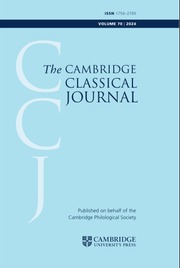Article contents
Lectures on Horace's Epistles
Published online by Cambridge University Press: 28 February 2013
Extract
Lecture one: Reading Horace, or L'homme et l'oeuvre
All criticism is also biography: and telling a story about a text is also telling a story about oneself. This is particularly true of Horace. When one writes about Horace, one is constructing a Horace, making the man: and constructing a Horace is inevitably also constructing oneself. Consider for example, Colin Macleod, whose last graduate class before his suicide was on Horace's Epistles, and who wrote extensively on Horace. Macleod's Horace was complex, often contradictory, morally serious – which fits Macleod of course.
- Type
- Research Article
- Information
- Copyright
- Copyright © The Author(s). Published online by Cambridge University Press 2008
References
WORKS CITED
- 4
- Cited by


